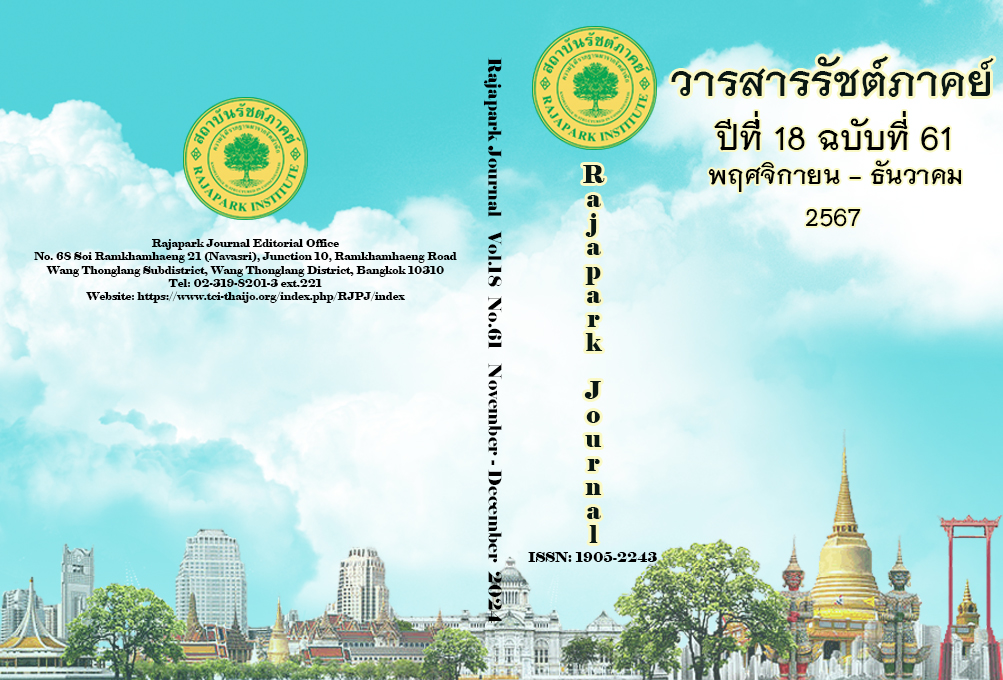Active Ageing: Concept Review Under the Context of Thailand
Main Article Content
Abstract
Due to the global trend of an aging society, including in Thailand, there are attempts to propose ideas to solve the problem of the Aging society. The idea that is often applied is the concept of Active Ageing. This article aims to study the literature to explain the concept of Active Ageing, a policy framework initiated by the World Health Organization (WHO) to provide a guideline for countries to follow. The goal is to enhance the quality of life for the elderly by offering opportunities for good health, social participation, and financial security. Active Aging can lead to successful aging. Result of the literature review found in the context of Thailand, the concept of Active Ageing adheres to and references the policy framework and principles of the WHO, with a primary focus on health issues. Thailand has initiated the National Elderly Plan and later enacted the National Elderly Law, with the implementation of these policies ongoing for a long time. All policy objectives align with the goals of Active Ageing. Research on Active Aging in Thailand encompasses various aspects and is not limited to a single discipline. The various studies aim to develop comprehensive measures to promote Active Aging among the Thai elderly. All research findings can be used for academic purposes or practical applications to benefit the daily lives of the elderly and serve as policy recommendations.
Article Details

This work is licensed under a Creative Commons Attribution-NonCommercial-NoDerivatives 4.0 International License.
Views and opinions appearing in the Journal it is the responsibility of the author of the article, and does not constitute the view and responsibility of the editorial team.
References
Department of Older Persons. (2023). Situation of the Thai older persons 2022. Amarin.
Fahamnuaypol, P. (2020). Development of active ageing assessment tool for the Thai elderly. Foundation of Thai Gerontology Research and Development Institute.
Foundation of Thai Gerontology Research and Development Institute. (2024). Ageing Focus: April 2024. https://thaitgri.org/?p=40236
Juthavantana, J., Sakunpong, N., Prasertsin U., & Charupheng, M. (2020). Confirmatory factor analysis of active ageing scale for Thai people in a nursing home. University of the Thai Chamber of Commerce Journal (Humanities and Social Sciences), 40(3), 50-64. https://so06.tci-thaijo.org/index.php/utccjournalhs/article/view/240422
Kaewsuwanna, K. (2017). Active ageing innovation for self-independence of ageing people in Nakhon Ratchasima Province. Journal of Rangsit Graduate Studies in Business and Social Sciences, 2(2), 28-42. https://rsujournals.rsu.ac.th/index.php/jdbs/article/view/265
Kespichayawattana, J. et al. (2006). Active ageing: A case study of elite Thai elderly. Thai Health Promotion Foundation.
Ministry of Social Development and Human Security. (2015). Declaration on Thailand’s older persons. https://www.dop.go.th/th/laws/1/30/767
Ministry of Social Development and Human Security. (2022). The 3rd National Plan on The Elderly 2023-2037. https://www.dop.go.th/th/laws/1/28/843
Ministry of Social Development and Human Security. (2023). Measures to implement national agenda on aged society. https://www.dop.go.th/th/know/5/155
Muangsakul, W. (2015). The concept of active ageing and capacity development of ageing living alone. Journal of Social Research, 38(2), 93-112. https://e-research.siam.edu/kb/the-concept-of-active-ageing/
National Statistical Office. (2017). Active ageing index of Thai elderly. Text and Journal Publication Company Limited.
Office of the Royal Society. (2020). Active ageing. https://www.facebook.com/RatchabanditThai/photos/a.3078834495507958/3489106474480756/?type=3
Office of the Royal Society. (2024). The royal institute dictionary published in 2011. https://dictionary.orst.go.th/index.php
Sombat, L., Yodpet, S., & Sakdaporn, T. (2011). Productive ageing and socio-economic development in Thailand. Ministry of Social Development and Human Security.
Sompoo, T., & Kheovichai, K. (2019). Development model of enhancing active ageing for elder club in Thailand. The Journal of Faculty of Applied Arts, 12(1), 35-45. DOI:10.14416/j.faa.2019.08.003
Suwan, P., & Therawiwat, M. (2021). From “active ageing” to “healthy ageing”. Thai Journal of Health Education. 44(1), 12-29. https://he01.tci-thaijo.org/index.php/muhed/article/view/249552
Suwanrada, W. et al. (2022). The project for reviewing, synthesizing, and developing strategic proposals for driving elderly care in Thailand. Thai Health Promotion Foundation.
Thanakwang, K., Isaramalai, S., & Hatthakit, U. (2014). Development and psychometric testing of the active ageing scale for Thai adults. https://www.ncbi.nlm.nih.gov/pmc/articles/PMC4116362/
World Health Organization. (2014). Active ageing: A policy framework. https://extranet.who.int/agefriendlyworld/active-ageing-a-policy-framework/
World Health Organization. (2020). Healthy ageing and functional ability. https://www.who.int/news-room/questions-and-answers/item/healthy-ageing-and-functional-ability
World Health Organization. (2022). Ageing and health. https://www.who.int/news-room/fact-sheets/detail/ageing-and-health
Yodpet, S. et al. (2022). Elderly school: The aimed of knowledge set for active ageing. Foundation of Thai Gerontology Research and Development Institute.


